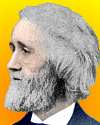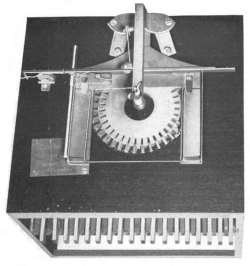 (source)
(source)
|
Christopher Latham Sholes
(14 Feb 1819 - 17 Feb 1890)
American inventor who developed the first practical typewriter, but being unable to create a market for it, sold the rights to the Remington Arms Company for $12,000.
|
Christopher Latham Sholes
First Typewriter Patent Model - Top View
This is a top view, showing the brass disk, slotted and connected with the type bars, also the platen, consisting of a metal bar rigidly fastened to the frame of the machine, and extending to the center of the aperture in the disk with sufficient common surface for each letter to strike at a common center; also showing the flat paper frame moving beneath the ribbon and platen, the paper being clamped at each corner of the frame. The ribbon movement apparatus having been lost or mislaid is not shown on the model. It consisted of spools fastened on each side of the frame, attached to the carriage movement in such manner as to move and present a fresh surface with each stroke of the key, and automatically reversing when the end of the ribbon was reached.
- Science Quotes by Christopher Latham Sholes.
- 14 Feb - short biography, births, deaths and events on date of Sholes's birth.
- Christopher Latham Sholes - First Typewriter Patent Model - Side View
- Grave of Christopher Latham Sholes - Early Photo Showing Only Cemetery Lot
- Christopher Latham Sholes - Home of the First Typewriter
- Christopher Latham Sholes - Letters to the First User of his Typewriter
- Christopher Latham Sholes - Colorized photograph.
- Christopher Latham Sholes - Photograph in sepia tone
- The Early History of the Typewriter - The first user of the first Sholes typewriter describes the inventor, and his own experience of Sholes’ new invention and its development.
- Sholes Grave Memorial - The copper plaque reads: Christopher Latham Sholes 1819 – 1890 “The Father of the Typewriter” Dedicated by The Young Men and Women of America In Grateful Memory of One Who Materially Aided in the World’s Progress.
- The Typewriter: An Illustrated History, by Typewriter Topics. - book suggestion.
- Booklist for Typewriter History.





